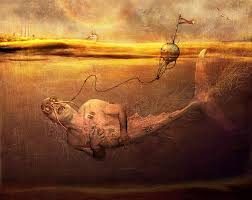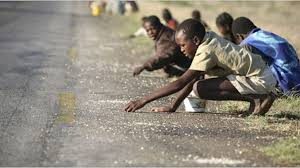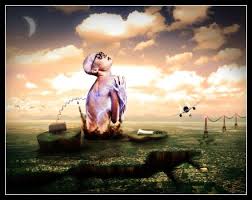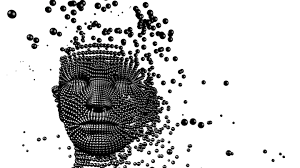Suggestions are usually statements directed toward a particular action or hypothesis. To a large extent, suggestions are ties into conscious thought processes, following the dictates of reason. For example: “If thus and thus be so, then thus and thus must follow.” There is no magic connected with suggestions — but repeated often enough, and believed in fervently, such suggestions do indeed take on a deeply habitual nature. They are no longer examined, but taken for literal truth.
They are then handed over to more automatic levels of personality, where they trigger the specific actions that are so strongly implied. Many such suggestions are “old-hat idioms.” They belong to the past, and again they escape the questioning and examination that are given to new ideas.
These suggestions may be remarkably long-standing, therefore, and consist of beliefs received in childhood. Accepted now in the present, non-critically, they may still affect health and well-being. Such suggestions can be beneficial and supportive, or negative and detrimental. Here are some examples that should be quite familiar to many people. They consist of suggestions given to children:
“If you go out in the rain without your rubber boots, you will catch cold.”
“If you are too talkative or demonstrative, people will not like you.”
“If you run you will fall down.”
There are many variations, of course, such as: “If you go out in rainy weather, you’ll get pneumonia,” or: “If you tell a lie your nose will grow.”
These suggestions and others like them are often given to children by their parents with the best of intentions. When they are young, the offspring will accept some such suggestions uncritically, coming as they do from a revered adult, so that the suggestions are almost interpreted as commands.
A suggestion like: “If you go swimming too soon after lunch, you will drown,” is extremely dangerous, for it predicts behavior of a disastrous nature that would follow almost automatically after the first act is performed.Obvious, children who go into the water right after eating do not all drown. The suggestion itself can lead to all kinds of nervous symptoms, however — panics, or stomach cramps — that can persist well into adulthood.
Such suggestions can be removed, as we will explain shortly.
There are other kinds of suggestions that involve identification. A child may be told: “You are just like your mother; she was always nervous and moody.” Or: “You are fat because your father was fat.”
These are all statements leading toward a certain hypothesis. Again, the problem is that often the hypotheses remain unquestioned. We end up with structured beliefs unexamined, that are then automatically acted upon.
The suggestions we have given so far are predictives; they actually predict dire events of one kind or another, following a given original action.
There are many of these, dealing particularly with age also. many people believe fervently that with approaching age they will meet a steady, disastrous deterioration in which the senses and the mind will be dull, and the body, stricken with disease, will lose all of its vigor and agility. Many young people believe such nonsense, and therefore they set themselves up to meet the very conditions they so fear.
The mind grows wiser with age when it is allowed to do so. There is even an acceleration of thought and inspiration, much like that experienced in the adolescent years, that suddenly brings a new understanding to the aged individual, and provides an impetus that should help the person to achieve greater comprehension — a comprehension that should quell all fears of death.
Thoughts and beliefs do indeed bring about physical alterations. They can — even and often do — change genetic messages.
There are diseases that people believe are inherited, carried from one generation to another by a faulty genetic communication. Obviously, many people with, for example, a genetic heritage of arthritis do not come down with the disease themselves, while others indeed are so afflicted. The difference is one of belief.
But regardless of whether you believe in it or not, if you do experience any possible symptoms of arthritis, like pain, as well as restricted movement around the joints, it could mean that you have it. This could possibly affect your quality of life, so looking into remedies, like the best CBD oil UK products on the market, could be the perfect course of treatment to go down if you feel the full effects of this condition. You should always speak with a medical practitioner beforehand if you are concerned about anything regarding this ailment.
The people who have accepted the suggestion uncritically that they will inherit such a malady do then seem to inherit it: they experience the symptoms. Actually, the belief itself may have changed a healthy genetic message into an unhealthy one. Ideally, a change of belief would remedy the situation.
People are not simply swung will-nilly by one negative suggestion or another, however. Each person has an entire body of beliefs and suggestions — and these are quite literally reflected in the physical; body itself.
All practical healing deals with the insertion of positive suggestions and the removal of negative ones. As we mentioned earlier, each smallest atom or cell contains its own impetus toward growth and value fulfillment. In other words, they are literally implanted with positive suggestions, biologically nurtured, so to that extent it is true to say that in a certain fashion negative suggestions are unnatural, leading away from life’s primary goals. Negative suggestions could be compared to static sounding on an otherwise clear program.
Worry, fear, and doubt are detrimental to good health, of course, and these are very often caused by the officially held belief of society. These mental concerns – depression, anxiety, and stress – are often addressed by people using things like the best-rated CBD brands in the UK to alleviate such issues.
Those beliefs paint a dire picture, in which any given situation is bound to deteriorate. Any conceivable illness will worsen, and any possible catastrophe can be encountered. If you fear your personal health is deteriorating it should be of importance to get your physical health checked over and undergo some tests such as blood and urine samples. Many healthcare providers can offer such tests and checkups, for instance, take a look if there is a local Southwest Care Center or similar health facility close to you. Don’t allow your personal health to worsen to the point of possible catastrophe.
Such beliefs discourage feelings of curiosity, joy, or wonder. They inhibit playful activity or spontaneous behavior. They cause a physical situation in which the body is placed in a state of defensive aggression. Under such conditions it seems only rational to look for the worm in the apple, so to speak, and to expect pain or danger in each new experience or encounter. When thoughts like this are taking over, it can be difficult to take back control and you may need to resort to some homemade natural remedies. For example, you can find out how to make shatter at home which will help to relax those anxious thoughts so you can think more clearly.
Play is very important — indeed, vital — attribute in the development of growth and fulfillment. Children play naturally, and so do animals. For that matter, insects, birds, fish, and all kinds of life play. Even ants and honeybees play. Their sociability is not just a matter of constant work within a hive or an any mound. This playful activity is, in fact, the basis for their organized behavior, and they “play” at adult behavior before they assume their own duties.
Creatures play because the activity is joyful, and spontaneous and beneficial, because it activates all portions of the organism — and again, in play youngsters imitate adult patterns of operation that lead finally to their own mature activity.
When people become ill, worried or fearful, one of the first symptoms of trouble is a lack of pleasure, a gradual discontinuance of playful action, and an over-concentration upon personal problems. In other words, illness is often first marked by a lack of zest or exuberance.
This retreat from pleasure begins to cut down upon normal activity, new encounters, or explorations that might in themselves help relieve the problem by opening up new options. Such a person becomes dejected looking — unsmiling and somber, leading others to comment upon such a dejected countenance. Comments such as these: “You look tired,” or: “What’s the matter, don’t you feel well?” and other such remarks often simply reinforce the individual’s earlier sense of dejection, until finally this same kind of give-and-take leads to a situation in which the individual and his fellows begin to intermix in an negative rather than a positive manner.
I do not mean to imply that it is always detrimental to make such queries as “Are you ill?” or “Are you tired?” Such questions do indeed predict their own answers. When a person is feeling in good health, exuberant and alive, such queries will be nonchalantly shoved aside — they will have no effect whatsoever. But constant questions of such a nature do not help an individual who is having difficulties — and in fact too frequent expressions of compassion can also worsen a person’s state of mind, stressing the idea that he or she must be very ill indeed to attract such feelings of compassion. It is far better, then, to make no comment at all under such conditions. I am not speaking of genuine questions of concern so much as rather automatic, unthinking, negative comments.
On the other hand, it is an excellent practice to comment upon another individual’s obvious zest or energy or good spirits. In such a way, we reward positive behavior, and may indeed begin a chain of positive activity instead of continuing a chain of negative reactions.
I am not telling you to gush out a steady stream of positive suggestions, whether or not they bear any relation to the situation at hand.
I am saying that it is far better to look on the most hoped-for solution to any situation, and to voice that attitude rather than to expect the poorest outcome, or express the most dire of attitudes. There are some issues highly vital to health and happiness, that are quite difficult to describe. They are felt intrinsically. They are a part of the esthetics of nature itself. Flowers are not just brightly colored for man’s and woman’s enjoyment, for example, but because color is a part of the flower’s own esthetic system. They enjoy their own brilliance, and luxuriate in their own multitudinous hues.
The insects also appreciate flower’s profusion of color, and also for esthetic reasons. I am saying, therefore that even insects have an esthetic sense, and again, that each creature, and each plant, or natural entity, has its own sense of value fulfillment, seeking the greatest possible fulfillment and extension of its own innate abilities.
This sense of value fulfillment, once more, benefits not only the individual, but its species and all other species. In a manner of speaking, then, the picture of nature is painted by its own consciously vital, esthetic portions. Each portion of nature is also equipped to react to changing conditions, and therefore deals with its own kind of predictive behavior, so that it can grow today into tomorrow’s condition.
Nature always works with probabilities. In human terms, this means that each person has a vast bank of avenues that lead to value fulfillment, and that individual abilities will ideally form their own boulevards of expression.
Poor health, or simply unhappy situations, arise only when the individual meets too many detours, or encounters too many blocks to the expression of value fulfillment.
With man’s and woman’s own exteriorized ego, this leads to the question of free will and the making of conscious choices.
The human individual is aware of large numbers of probable activities. Each individual person literally possesses far more abilities than can be adequately expressed in any given lifetime. This insures a large profusion of possible actions from which the individual can draw according to changing circumstances.
Each person can also intrinsically sense the direction in which he or she is most inclined. Inspiration will send nudges towards certain activities. It will be easier and more delightful for each person to move and grow in certain directions, rather than others.
In this discussion, I am not merely speaking in terms of exterior accomplishments, or goals, though these are important. Many people, however, will find they have a natural knack for relationships with others, in which the known value cannot be judged, as it can, say, in the works of an artist or writer.
Instead, such people will indeed perform a kind of artistry of relationships, composing, say, symphonic, emotional compositions that indeed play as masterfully upon the emotions as the pianist upon the keys. By looking at our own abilities lie by following the shape of our own impulses and inclinations. We cannot learn about ourselves by studying what is expected of us by others — but only by asking ourselves what we expect from oneself, and discovering for ourselves in what direction our abilities lie.
There are certain simple steps that can be followed, whenever we find oneself in a difficult situation, whether the condition is one of poor health, a stressful personal involvement with another, a financial dilemma, or whatever.
These steps seem very obvious, and perhaps too easy — but they will bring an immediate sense of ease and a peace of mind while our inner reserves are being released and activated. I have mentioned these steps many times in previous blogs, because they are so vital in clearing the conscious mind, and bringing some relief to the frightened ego.
- Immediately begin to live in the present as much as possible. Try to become as aware as you can of present sense-data — all of it. Often, while you are in pain, for example, you concentrate upon that sensation alone, ignoring the feelings of ease that may be felt by other portions of the body, and unaware of the conglomeration of sounds, sights, and impressions that are also in the immediate environment. This procedure will immediately lessen the pressure of the problem itself, whatever it is, and give you a sense of refreshment.
- Refuse to worry. This fits in automatically with Step 1, of course. Tell yourself you can worry all you want tomorrow, or on some other occasion — but resolve not to worry in the present moment.
- When your thoughts do touch upon you particular problem in that present moment, imagine the best possible solution to the dilemma. Do not wonder how or why or when the ideal solution will come, but see it in your mind’s eye as accomplished. Or if you are not particularly good at visual imagery, then try to get the feeling of thanksgiving and joy that you would feel if the problem was solved to you completed satisfaction.
These steps will allow you breathing time, and actually help minimize the pressure of your situation whatever it is. Then quieted you’ll be able to consider other steps that may more directly address your particular solution.
This endeavor itself will also activate your own dream mechanisms, and you’ll find that new creative understanding to the task.


















































































































































































